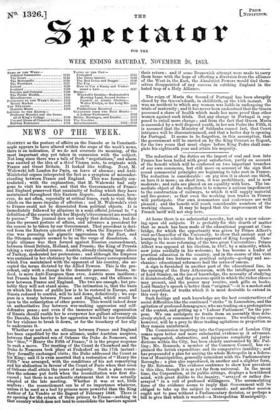NEWS OF THE WEEK.
SLIGHTLY as the posture of affairs on the Danube or in Constanti- nople appears to have altered within the scope of the week's news, there is an indication, if we do not overrate its meaning, of the most important step yet taken in connexion with the subject. Not long since there was a talk of fresh " negotiations," and alarm was excited at the idea of a third Vienna note, to originate with France and Great Britain. It looked like trifling. Next, M. Walewski left London for Paris, on leave of absence ; and Anti- Ministerial organs interpreted the fact as a symptom of misunder- standing between France and England. This was formally con- tradicted ; with the explanation, that M. Walewski had only gone to visit his master, and that the Governments of France and England preserved that unanimity of feeling which they have maintained throughout this Eastern dispute. Ambassadors, how- ever, do not often, especially at critical times, rush to visit their chiefs on the mere impulse of affection ; and M. Walewski's visit to France could not be dissociated from political objects. It is immediately followed by allusions in a semi-official journal to " a definition of the course which her Majesty's Government are resolved to pursue." The journal does not supply that definition ; but de- fines the present posture of affairs, and advances a precedent for the course to be taken by our Government. That precedent is deri- ved from the Eastern question of 1789 ; when the Empress Cathe- rine was pursuing her gigantic aggressions in the East, and the Ottoman empire seemed to be on the verge of dissolution. A triple alliance was then formed against Russian encroachment, between Great Britain, Holland, and Prussia; the King of Prussia taking a very decided course. Austria, already claiming large slices of Turkey, moderated her pretensions ; and although the Empress was sustained in her obstinacy by the extraordinary correspondence which Fox maintained with the opponent of his country, she ac- cepted the terms dictated by the Allied Powers. This is the pre- cedent, only with a change in the dramatis persona;. Russia in- deed, is more Anti-European than ever, Austria more insidi
i ous ; but Prussia has lost her decision and energy, and the alliance is now between France and England. The two are enough ; but pro- bably they will not stand alone. The intimation is, that the basis on which the force of public law is to be restored in Europe, and Russia reduced to control, will be laid down, definitively ; we sup- pose in a treaty between France and England, which would be open to the subscription of other powers. This would indeed draw an authoritative line between war-making aggression and self- defensive peace ; and even if the immense military organization of Russia Should enable her to overpower her gallant adversary on the Danube, this barrier to her aggression would be too formidable for her violence to break it down, or for the treachery of her ally to undermine it.
Whether or not such an alliance between France and England has been expedited by the new alliance, under Austrian auspices, between that penitent son of Orleans the Duke de Nemours, and his " Sire," "Henry the Fifth of France," it is the proper response to such a move. The meeting of the Count de Chambord and the Duke de Nemours took place at Frohsdorf on the 17th instant : they formally exchanged visits; the Duke addressed the Count as his King ; and it is even asserted that "a restoration of " Henry the Fifth " /was arranged, with. the conditions of his not remarrying and lib abdication in favour of the Count of Paris when that scion of Orleans shall attain the years of majority. Such a plan resem- bles the scheme put forth when the reconciliation was first dis- cussed ; but there is no authentic statement that it was actually adopted at the late meeting. Whether it was or not, little matters : the reconcilement can be of no importance whatever, unless it be used as a tool by princes more powerful than the King Arthur of La Vendee or the Regent of February 1848. There is no opening for the return of these princes to France—nothing in that country which does not tend to consolidate the barriers against their return ; and if some Brunswick attempt were made to carry them home with the hope of effecting a diversion from the alliance of the West in the East, the Absolutist Powers would find them- selves disappointed of any success in catching England in the hated trap of a Holy Alliance.


























